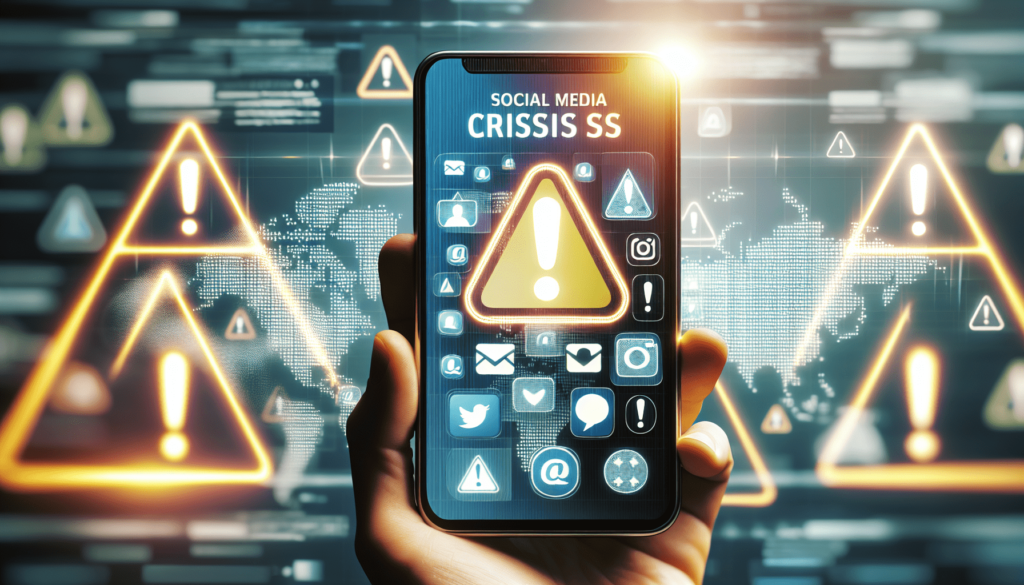In the ever-evolving realm of social media, crises can strike when you least expect them, potentially derailing your digital success. “What Are The Best Practices For Managing A Social Media Crisis To Maintain Digital Success?” delves into effective strategies that can help you navigate these turbulent waters with confidence. From prompt responses and transparent communication to leveraging the power of social listening, this article is your go-to guide for ensuring calm during the storm and safeguarding your online reputation.
What Are The Best Practices For Managing A Social Media Crisis To Maintain Digital Success?
Have you ever wondered what steps you should take when a social media crisis erupts? Managing a social media crisis effectively is crucial for maintaining your digital success. In this article, we will delve into the best practices that can help you navigate through turbulent digital waters smoothly and maintain your brand’s reputation.

Understanding a Social Media Crisis
A social media crisis can be defined as any situation that has the potential to damage the reputation of your brand or business through social media platforms. These crises can range from negative customer feedback gone viral to a significant error in your social media posts.
Characteristics of a Social Media Crisis
Before you can effectively manage a crisis, you need to understand what differentiates a crisis from regular negative feedback. Here are some key characteristics:
- Escalation: The issue quickly gains traction and spreads across various platforms.
- High Engagement: A large number of people are interacting with the concerned posts.
- Attention from Influencers: Influential figures are discussing the issue, increasing its visibility.
- Reputational Risk: The situation poses a significant threat to your brand’s reputation.
Examples of Social Media Crises
Understanding past crises can help you prepare for future ones. Here are a couple of notable examples:
- United Airlines: In 2017, the forceful removal of a passenger led to severe backlash.
- Pepsi: The controversial advertisement featuring Kendall Jenner sparked widespread criticism.
Best Practices to Manage a Social Media Crisis
Now that you know what constitutes a social media crisis, let’s delve into the best practices for managing it to maintain your digital success.
1. Have a Crisis Management Plan
One of the most crucial steps is to have a crisis management plan in place.
Components of a Crisis Management Plan
- Monitoring Tools: Use tools like Hootsuite or Sprout Social to monitor conversations and sentiment.
- Response Team: Assemble a team responsible for managing crises, including roles like PR experts, social media managers, and legal advisors.
- Chain of Command: Clearly define who has the authority to make decisions in a crisis.
- Communication Templates: Prepare templates for quick responses that can be customized.
| Component | Description |
|---|---|
| Monitoring Tools | Tools to track conversations and sentiment |
| Response Team | PR experts, social media managers, legal |
| Chain of Command | Defined authority and decision-makers |
| Communication Templates | Prepared statements for quick responses |
2. Act Quickly and Decisively
Speed is of the essence when it comes to handling a social media crisis. The longer you take to respond, the more the situation can escalate.
Steps to Ensure Quick Response
- Designate Responsibility: Ensure someone is always monitoring social media.
- Approval Process: Streamline your approval process for crisis communications.
- Real-Time Updates: Keep your audience updated in real-time.
3. Own the Mistake and Apologize
Transparency and honesty go a long way in crisis management. If your brand made a mistake, acknowledging it and apologizing can help mitigate damage.
Tips for Crafting an Apology
- Be Sincere: Authenticity is crucial. Don’t sound like a robot.
- Take Responsibility: Acknowledge the mistake without making excuses.
- Provide Solutions: Mention how you plan to rectify the issue and prevent future occurrences.
4. Monitor the Situation and Engage
After issuing your initial response, continuously monitor the situation. Engagement with your audience is essential to manage the crisis effectively.
Tools for Monitoring
- Google Alerts: Set alerts for relevant keywords and phrases.
- Social Listening Tools: Tools like Brandwatch can help you track ongoing conversations.
| Tool | Purpose |
|---|---|
| Google Alerts | Set alerts for relevant keywords |
| Brandwatch | Track ongoing conversations |
5. Learn and Adapt
Once the crisis is resolved, it’s essential to analyze what went wrong and what was done right. Learning from the experience can help you better prepare for future incidents.
Post-Crisis Evaluation
- Conduct a Debrief: Gather your crisis management team and discuss what worked and what didn’t.
- Update Your Plan: Make necessary adjustments to your crisis management plan.
- Feedback from Stakeholders: Collect and analyze feedback from your audience and stakeholders.
6. Communicate Transparently
Transparent communication is key to managing a social media crisis. Consistently update your audience on the steps being taken to resolve the issue.
Maintaining Transparency
- Regular Updates: Keep your audience informed through regular updates on social media and your website.
- Behind-the-Scenes Insights: Share insights into the steps you are taking to resolve the issue.
7. Use Professional Help if Needed
Sometimes, a social media crisis can be too overwhelming to manage on your own. In such cases, seeking professional help can be beneficial.
Types of Professional Help
- PR Agencies: Professional PR agencies specialize in managing crises.
- Legal Advisors: Consult legal advisors if there are legal implications.
- Social Media Consultants: Experts can provide valuable insights and strategies.
| Professional Help | Function |
|---|---|
| PR Agencies | Specialize in managing crises |
| Legal Advisors | Consult for legal implications |
| Social Media Consultants | Provide insights and strategies |

Conclusion
Dealing with a social media crisis is undoubtedly challenging, but with the right strategies and tools, you can navigate through it while maintaining your digital success.
Reflect on these steps and continually update your crisis management plan to be better prepared for any future crises. Your brand’s resilience and transparency can turn a crisis into an opportunity for growth and learning.
In conclusion, understanding the gravity of a social media crisis and implementing best practices for managing it can save your brand from significant reputational damage. Equip yourself with the tools, knowledge, and strategies outlined in this article to uphold your digital success in the face of adversity.
Remember, the key to effectively managing a social media crisis lies in preparation, quick and decisive actions, transparent communication, and a willingness to learn and adapt. By following these best practices, you can turn potential crises into opportunities for demonstrating your brand’s integrity and commitment to your audience.

